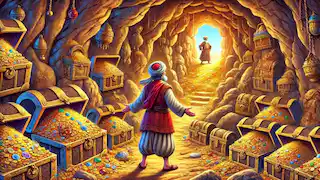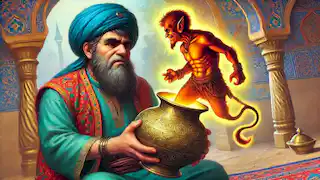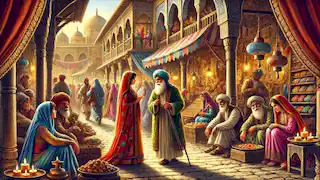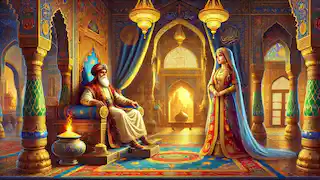In a land of ancient splendor and enchanting tales, there was a kingdom ruled by a mighty king named Shahryar. His reign was marked by prosperity, but his heart was shrouded in darkness. Once a loving and benevolent ruler, Shahryar's soul had been deeply scarred by betrayal. His beloved queen, whom he trusted above all others, had been unfaithful to him. This betrayal poisoned his heart with bitterness and led him down a path of vengeance.
To protect himself from further heartbreak, Shahryar devised a cruel plan. Each day, he would marry a new bride, only to have her executed at dawn the following morning. The people of the kingdom lived in fear, knowing that their daughters could be chosen next for the king's deadly scheme. The kingdom's sorrow deepened with each passing day as hope seemed to vanish like the morning mist.
It was during this time of despair that a young woman named Scheherazade stepped forward. She was the daughter of the king's loyal vizier, and her heart was filled with both wisdom and courage. Scheherazade believed she could end the king's cruel practice by enchanting him with stories so captivating that he would spare her life to hear more.
With a heart full of resolve, Scheherazade approached her father with her plan. The vizier was horrified at the thought of his beloved daughter facing the king's wrath, but he could not sway her determination. Reluctantly, he presented her to the king as his next bride.
On the night of their marriage, Scheherazade began to weave her first tale. She spoke of distant lands, mystical creatures, and adventures that stirred the soul. Her words were like a magical tapestry, each thread meticulously woven to create a picture of wonder and excitement. The king, entranced by her storytelling, postponed her execution for one more day, eager to hear the conclusion of the tale.
And so, Scheherazade continued her stories night after night. Each dawn, she would pause at a moment of suspense, leaving the king yearning for more. Her tales ranged from heroic deeds to romantic sagas, from humorous anecdotes to profound moral lessons. With each story, she not only captivated the king but also began to heal his wounded heart.
One of Scheherazade's most beloved tales was that of Ali Baba and the Forty Thieves. In this story, Ali Baba, a poor woodcutter, discovers a secret cave filled with treasure, hidden by a band of thieves. By using the magical phrase "Open Sesame," Ali Baba gains access to the wealth within. However, his greedy brother, Kassim, is not so fortunate and meets a tragic end due to his avarice. Through this story, Scheherazade subtly conveyed the dangers of greed and the virtues of wisdom and caution.
Another night, she recounted the adventures of Sinbad the Sailor. Sinbad's voyages were fraught with peril, from monstrous sea creatures to treacherous islands. Yet, through his bravery and cleverness, he always found a way to survive and return home with tales of wonder. These stories of Sinbad reminded the king of the resilience of the human spirit and the rewards of perseverance.
As the nights turned into weeks, the king's heart began to soften. He found himself not only enthralled by the stories but also by Scheherazade herself. Her intelligence, grace, and compassion shone through her tales, and Shahryar began to question the cruelty he had inflicted upon his kingdom.

One fateful night, Scheherazade told the story of The Fisherman and the Jinni. In this tale, a poor fisherman discovers a brass jar containing a powerful jinni. The jinni, angry at being trapped for centuries, vows to kill the fisherman. However, through quick thinking and cleverness, the fisherman tricks the jinni back into the jar and seals it once more. This story highlighted the themes of justice and the triumph of wit over brute strength.
With each story, Scheherazade planted seeds of change in the king's heart. Her tales became a mirror through which Shahryar saw the consequences of his actions and the possibility of redemption. He began to realize that his desire for vengeance had only brought more suffering, not just to his kingdom but also to himself.
As the thousand and one nights passed, Scheherazade's life was spared again and again. Her stories had become a lifeline, not only for her but for the entire kingdom. The people, once living in fear, began to feel hope returning. They whispered among themselves about the brave and wise Scheherazade, whose stories were said to hold magical powers of transformation.
One evening, Scheherazade told the tale of Aladdin and the Magic Lamp. Aladdin, a poor young man, finds a magical lamp that grants him extraordinary powers. With the help of the genie within the lamp, Aladdin transforms his life, winning the heart of a princess and defeating an evil sorcerer. This story of Aladdin, with its themes of love, adventure, and triumph over evil, further captivated the king's imagination.
Through her storytelling, Scheherazade was not only saving her own life but also transforming the soul of the king. The power of her words worked like a balm, healing the wounds of betrayal and anger that had festered in Shahryar's heart for so long. Slowly, the king began to understand the value of mercy, compassion, and love.

As the final night approached, Scheherazade prepared her most poignant story. She recounted the tale of The Three Apples, a murder mystery filled with twists and turns. The story revolved around a fisherman who discovers a chest containing the body of a murdered woman. Through a series of intricate events and clever deductions, the mystery is unraveled, revealing deep insights into human nature and justice.
When Scheherazade finished her tale, she paused and looked into the king's eyes. She saw not the man who had sentenced so many to death, but a man who had been transformed by the power of her stories. King Shahryar, with tears in his eyes, realized the depth of his cruelty and the preciousness of life.
He rose from his throne and declared, "Scheherazade, you have saved not only your life but also my soul. Your stories have shown me the error of my ways. From this day forward, I vow to be a just and compassionate ruler. I will never again take the life of an innocent."
The kingdom rejoiced at the news. Scheherazade had not only survived but had also brought about a profound change in the king. Her courage, wisdom, and the power of her storytelling had healed a wounded heart and restored hope to the land.
Scheherazade and Shahryar ruled the kingdom together, their reign marked by justice, compassion, and prosperity. The tales of Scheherazade continued to be told, passed down through generations, a testament to the power of stories to transform hearts and minds.
However, Scheherazade’s life was not limited to the palace walls. She often wandered through the bustling markets and narrow streets of the kingdom, listening to the stories of her people. She knew that her role as queen was not just to rule but to understand the lives of those she served.

One day, as she walked through the marketplace, she encountered an old storyteller named Harun. His tales were legendary among the townsfolk, and his wisdom was revered. Scheherazade sat with him, eager to hear his stories and to learn from his vast experiences.
Harun shared tales of the past, stories of kings and queens, of love and betrayal, of war and peace. He spoke of a time when the kingdom was on the brink of ruin, saved only by the courage of a single woman who stood up against tyranny. Scheherazade realized that these stories held lessons that could guide her in her own life as a queen.
Through her interactions with Harun, Scheherazade learned the importance of humility and the power of listening. She understood that every person, no matter how small, had a story worth telling. She began to invite the people of the kingdom to the palace, where they could share their tales and be heard.
As the kingdom flourished under Shahryar and Scheherazade’s rule, the bond between the king and his people grew stronger. The once distant and feared ruler became a beloved figure, known for his wisdom and compassion. Shahryar himself often marveled at the transformation he had undergone, all thanks to Scheherazade’s stories.
One evening, Shahryar and Scheherazade sat together in the palace garden. The moonlight bathed the garden in a soft glow, and the fragrance of blooming flowers filled the air. Shahryar turned to Scheherazade and said, “Your stories have saved us both. You have shown me the beauty of life and the importance of kindness. I am forever grateful.”
Scheherazade smiled and replied, “Stories have the power to heal, to teach, and to transform. They connect us to our humanity and remind us of our shared experiences. As long as we continue to listen and to tell our tales, we will never be lost.”
In the years that followed, Scheherazade and Shahryar became known as the great storytellers of their time. They traveled to distant lands, sharing their stories and learning new ones. They visited kingdoms far and wide, spreading the message of peace, compassion, and the power of storytelling.

Their legacy lived on through the stories they told and the lives they touched. Scheherazade’s name became synonymous with wisdom and courage, a symbol of the transformative power of stories. The kingdom continued to prosper, guided by the lessons learned from the tales of Scheherazade.
And so, the story of Scheherazade and Shahryar became one of the greatest legends of the Arabian Nights. It was a story of redemption, of love, and of the enduring power of stories to change the world. Through the magic of her tales, Scheherazade had not only saved her own life but had also brought about a profound transformation in the heart of a king and the soul of a kingdom.



















